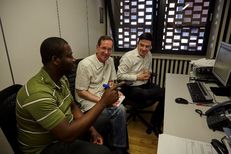A people-centric organic approach to applied learning and research that has gained high-level endorsement for a collaborative working to tackle institutional and community sustainability challenges.
What advice would you give an institution staff member keen to progress Living Labs?
“Just go out and talk to people. You can write emails and read what other people have done/ draft a strategy but talking to people, making connections and understanding what they do is so important.” – Sara Lynch, Environmental Manager
As with many institutions, the Queen’s Living Lab has been developing organically over a number of years. Pockets of fantastic practice are taking place, however it is very people-centric and therefore depends on individual staff to create stakeholder partnerships. There are likely to be many instances of Living Lab style work occurring yet individuals leading on or involved with this may not be aware of the Living Lab label.
A great example of partnership working between students, academics and estates staff is in the opening up of the University’s Combined Heat Power (CHP) plant to students in the School of Chemistry. Going beyond the institutional walls of the University, Living Lab style partnerships are occurring through the Queen’s Science Shop, sitting in the Careers and Employability Team. The Science Shop provides partnership working opportunities between students and local community groups, public sector organisations and NGOs who develop research projects with students and make use of the outputs and learnings from this. Although the scope of such projects can vary, some examples shared were explicitly sustainability focussed.
High-level endorsement of engaging students and researchers to support the institution in tackling sustainability challenges has been recognised as significant progress at Queen’s. Senior Management have acknowledged the great benefit for not only the institution, but also student learning and therefore development of graduate competencies that can be made from utilising the estate as a test bed for live research.
Common challenges faced when working to develop and progress Living Lab opportunities at Queen’s are similar to those identified in the EAUC-NUS Sustainability in Education survey on applied learning and research in tertiary education. Where estates staff want to progress Living Labs, time resource was highlighted as an on-going barrier for progressing this as there are no staff at Queen’s working in sustainability who have a 100% engagement or policy focused role. In addition to this, a history of staff roles and departments being perceived as significantly separated from teaching, learning and research can create challenges in forming partnership working. This is a common theme and it is often the case that staff informally leading on Living Labs feel that ideally a role will be allocated to bridge the gap between academics and professional departments to support the facilitation and coordination of research and applied learning partnerships.
Although there is recognition of the importance of Living Lab opportunities in the University’s Social Charter and a commitment within the University Corporate strategy, staff at Queen’s are still keen to gain more momentum and whole-institution recognition of Living Labs.






 Except where otherwise stated, content on this site is
licensed under a Creative Commons Attribution 3.0 License.
Except where otherwise stated, content on this site is
licensed under a Creative Commons Attribution 3.0 License.
